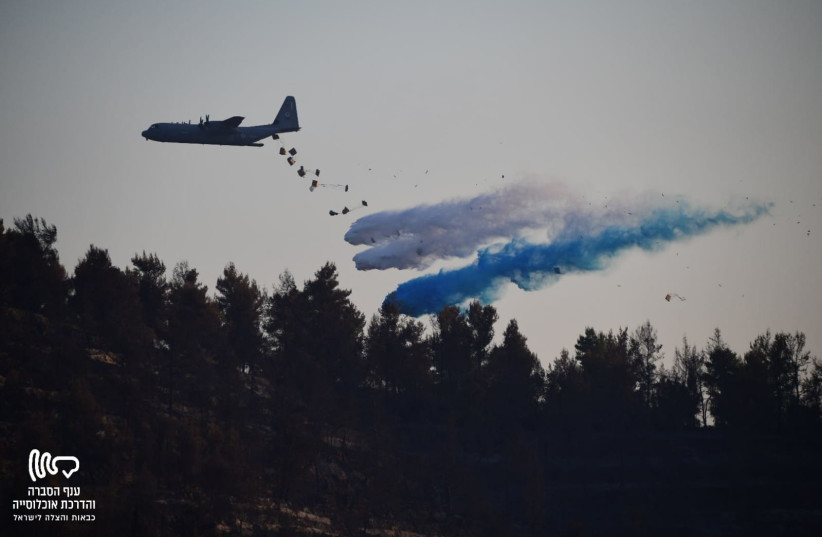This week’s devastating wildfires in the Jerusalem hills highlight the need for the government to consider a new approach and measures that would help Israel cope more effectively with such crises in the future.
What’s needed now is a comprehensive plan to boost the firefighting budget, beef up the country’s fire services, and enable the acquisition of sufficient firefighting trucks and planes to allow Israel to fight fires by itself, without seeking international help. As KKL-JNF’s Omri Bone, who assisted in the current firefighting campaign suggested, this disaster should be seen as “an opportunity for change.”
The wildfires burned some 2,000 hectares (5,000 acres) and caused the evacuation of almost 10,000 residents in the areas around Beit Meir, where firefighters said the blaze began on Sunday afternoon.

Planes and crews fought the fires for a third day yesterday as strong winds and dry heat fanned the flames in the wooded hills some 10 km. west of Jerusalem.
The Israel Fire and Rescue Authority, which declared a general call-up on Monday afternoon, said 75 crews and 10 planes had battled the blaze. At the same time, Israel – which in the past has provided assistance to other countries in the region fighting fires – at one point requested help itself – from among others, Greece, Turkey, Cyprus, Italy and France, before retracting the request when the fires were brought under control.
The wildfires are said to be the largest ever in the Jerusalem area, surpassing the forest fires in 1995 and approaching the scale of the 2010 Mount Carmel fire, which claimed the lives of 44 people, gutted 5,000 hectares of forest and raged for 77 hours.
Since the Mount Carmel fire, firefighting services have improved their capabilities and received more resources, but not nearly enough.
As the process of recovery from the current fires – which may take decades – begins, residents of the area will need assistance from the government. We join them in urging the government to use this opportunity to make some real reforms in the Fire and Rescue Authority.
According to the Public Security Ministry, the Fire and Rescue Authority “is the official fire and rescue organization of the State of Israel, in charge of extinguishing and preventing the spread of fires, saving lives and salvaging property.”
The Israel Fire and Rescue Authority Law was passed in the Knesset in 2012, and went into effect on February 8, 2013, establishing the Israel Fire and Rescue Authority within the Public Security Ministry. The Authority is commanded by the Fire and Rescue Commission – headed by a commissioner – which directs and coordinates its operations.
It is responsible for establishing an elite firefighting unit to respond to extreme situations; to recruiting hundreds of firefighters; to building fire stations to enable a shorter response time as well as necessary equipment like fire trucks.
Most of these, according to sources in the Fire and Rescue Authority, have not yet been achieved. It is time to revisit these goals and set new ones. The government is also said to be planning a reform of fire regulations, and as of 2026, enshrine all the commissioner’s provisions in regulations approved by the Knesset.
The most sobering statement on the subject came from Environmental Protection Minister Tamar Zandberg, who warned that extreme weather conditions and wildfires will become more frequent and more powerful in coming years, due to global warming.
“This requires us to prepare completely differently for the impending climate disasters,” Zandberg said. “I am working for the State of Israel to declare a climate emergency. We must define the climate crisis as a strategic threat, which all parties need to prepare for and deal with better. Because from now on it’s going to get worse and worse. There is something to be done, and it needs to be done now.”
As Zandberg suggests, in order to excel in this new era, Israel needs to change its mindset about dealing with climate disasters such as flooding in the winter and wildfires in the summer. Fighting fires is a job not just for firefighters.
